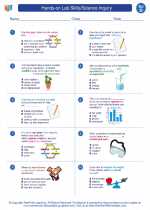Biodiesel: An Overview
Biodiesel is a renewable, clean-burning alternative fuel made from natural, renewable sources such as vegetable oils and animal fats. It is produced through a chemical process called transesterification, in which the oils or fats are combined with alcohol (usually methanol or ethanol) and a catalyst (such as sodium hydroxide) to produce biodiesel and glycerin as byproducts.
Advantages of Biodiesel
- Reduces greenhouse gas emissions
- Can be used in existing diesel engines with little to no modification
- Biodegradable and non-toxic
- Contributes to energy independence by reducing reliance on petroleum-based fuels
Disadvantages of Biodiesel
- May increase nitrogen oxide emissions in some engines
- Requires large quantities of feedstock (vegetable oils, animal fats) which can impact food supply
- Can lead to deforestation if feedstock crops are not sustainably sourced
Study Guide
1. What are the main sources of feedstock for biodiesel production?
The main sources of feedstock for biodiesel production are vegetable oils (such as soybean, canola, and palm oil) and animal fats (such as tallow and yellow grease).
2. What is the chemical process used to produce biodiesel?
Biodiesel is produced through a chemical process called transesterification, in which the oils or fats are combined with alcohol and a catalyst to produce biodiesel and glycerin as byproducts.
3. What are the advantages of using biodiesel as a fuel?
The advantages of using biodiesel as a fuel include reducing greenhouse gas emissions, compatibility with existing diesel engines, biodegradability, and contributing to energy independence.
4. What are the potential disadvantages of biodiesel?
Potential disadvantages of biodiesel include increased nitrogen oxide emissions in some engines, competition for feedstock with food supply, and the potential for deforestation if feedstock crops are not sustainably sourced.
5. How does biodiesel contribute to sustainability and environmental protection?
Biodiesel contributes to sustainability and environmental protection by reducing reliance on fossil fuels, reducing greenhouse gas emissions, and promoting the use of renewable resources for fuel production.
.◂Science Worksheets and Study Guides Fourth Grade. Hands-on Lab Skills/Science Inquiry

 Worksheet/Answer key
Worksheet/Answer key
 Worksheet/Answer key
Worksheet/Answer key
 Worksheet/Answer key
Worksheet/Answer key
